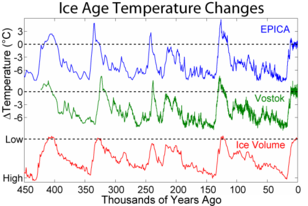Jongpleistozän
Erscheinungsbild
(Widjerfeerd faan Jungstiinjtid)
| Süsteem | Serie | Kirew | ≈ Ääler (mya) |
|---|---|---|---|
| Quartär | Holozän | Holozän | 0,0117–0 |
| Pleistozän | Jongpleistozän (Tarantium) |
0,126–0,0117 | |
| Madelpleistozän (Ionium) |
0,781–0,126 | ||
| Ualpleistozän (Calabrium) |
1,806–0,781 | ||
| Gelasium | 2,588–1,806 | ||
| ääler | ääler | ääler | ääler |
At Jongpleistozän (Tarantium) as det jongst kirew faan't Pleistozän. Hat fäält tuup mä't Eem waremtidj an mä't Weichsel kuultidj.


Weichsel kuultidj
[Bewerke | Kweltekst bewerke]| Kuultidj (Glazial)/ Waremtidj (Interglazial) |
Kuuler tidj (Stadial)/ Warmer tidj (Interstadial)[1] |
Tidjrüm (f. Kr.) |
|---|---|---|
| Weichsel leed kuultidj | ||
| Jüngere Dryaszeit | 10.730–9.700 | |
| Alleröd-Interstadial | 11.400–10.730 | |
| Ältere Dryaszeit | 11.590–11.400 | |
| Bölling-Interstadial | 11.720–11.590 | |
| Älteste Dryaszeit | 11.850–11.720 | |
| Meiendorf-Interstadial | 12.500–11.850 | |
| Weichsel huuch kuultidj | ||
| Mecklenburg-Phase | 15.000–13.000 | |
| Pommern-Phase | 18.200–15.000 | |
| Lascaux-Interstadial | 19.000–18.200 | |
| Laugerie-Interstadial | 21.500–20.000 | |
| Frankfurt-Phase | 22.000–20.000 | |
| Brandenburg-Phase | 24.000–22.000 | |
| Tursac-Interstadial | 27.000–25.500 | |
| Maisières-Interstadial | 30.500–29.500 | |
| Denekamp-Interstadial | 34.000–30.500 | |
| Huneborg-Stadial | 39.400–34.000 | |
| Hengelo-Interstadial | 41.300–39.400 | |
| Moershoofd-Interstadial | 48.700 | |
| Glinde-Interstadial | 51.500 | |
| Ebersdorf-Stadial | 53.500 | |
| Oerel-Interstadial | 57.700 | |
| Weichsel ääder kuultidj | ||
| Schalkholz-Stadial | 60.000 | |
| Odderade-Interstadial | 74.000 | |
| Rederstall-Stadial | ? | |
| Brörup-Interstadial | ? | |
| Amersfoort-Interstadial | ? | |
| Herning-Stadial | 115.000 | |
| Eem waremtidj | ||
| 126.000 |
Futnuuten
[Bewerke | Kweltekst bewerke]- ↑ Thomas Litt, Achim Brauer, Tomasz Goslar, Josef Merkt, Krystyna Bałaga, Helmut Müller, Magdalena Ralska-Jasiewiczowa, Martina Stebich, Jörg F. W. Negendank: Correlation and synchronisation of Lateglacial continental sequences in northern central Europe based on annually laminated lacustrine sediments. In: Quarternary Science Reviews. vol. 20, Nr. 11, Mai 2001, S. 1233–1249.
